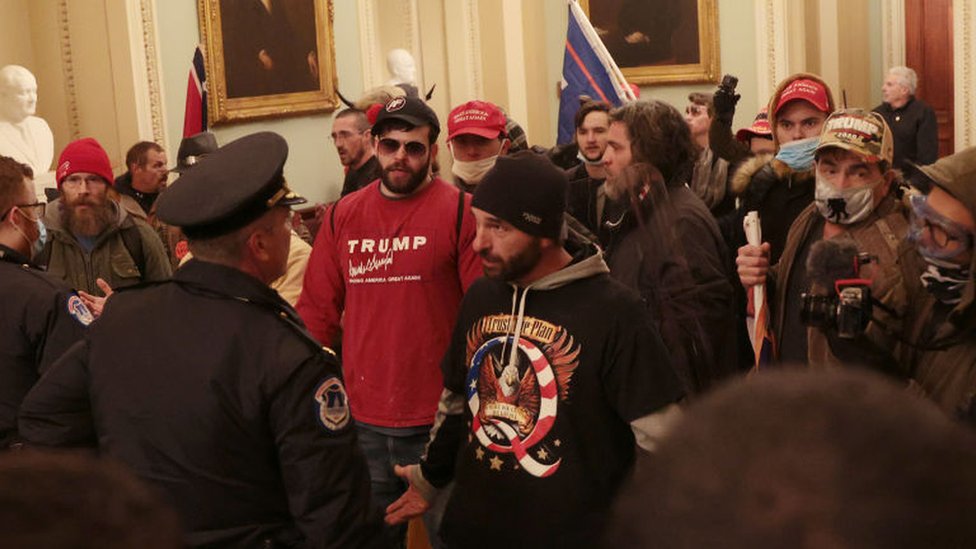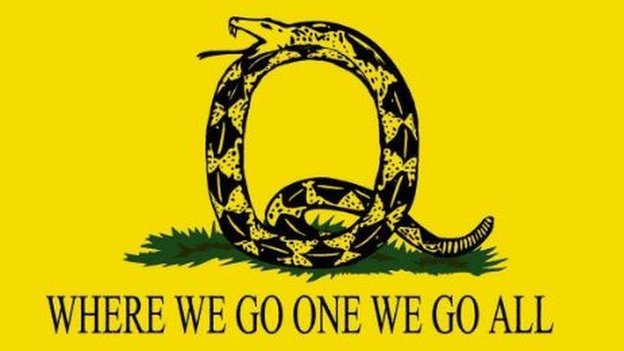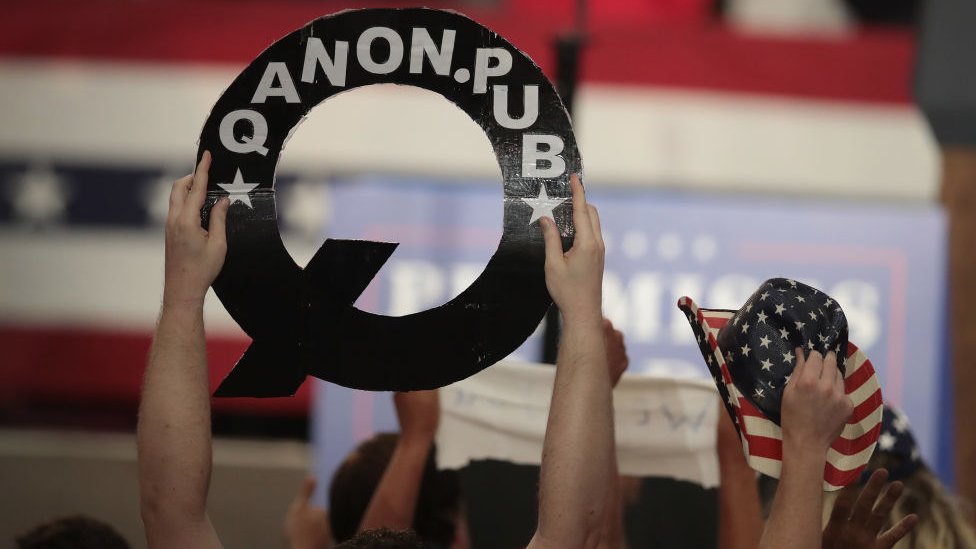EEUU: quién es quién en la viña del SEñOR
QAnon: What is it and where did it come from?
By Mike Wendling
BBC News 7january 2021
 image copyrightGetty Images
image copyrightGetty ImagesSupporters of the QAnon movement were among the crowd that stormed the US Capitol building on Wednesday.
Several prominent activists were spotted inside the building, and others flew Q-themed banners inside and out.
President Trump - viewed as a hero by the movement - has stopped short of endorsing the conspiracy theory but has described QAnon activists as "people who love our country."
So what is QAnon and who believes in it?
What is it?
At its heart, QAnon is a wide-ranging, completely unfounded theory that says that President Trump is waging a secret war against elite Satan-worshipping paedophiles in government, business and the media.
QAnon believers have speculated that this fight will lead to a day of reckoning where prominent people such as former presidential candidate Hillary Clinton will be arrested and executed.
That's the basic story, but there are so many offshoots, detours and internal debates that the total list of QAnon claims is enormous - and often contradictory. Adherents draw in news events, historical facts and numerology to develop their own far-fetched conclusions.
Where did it all start?
In October 2017, an anonymous user put a series of posts on the message board 4chan. The user signed off as "Q" and claimed to have a level of US security approval known as "Q clearance".
These messages became known as "Q drops" or "breadcrumbs", often written in cryptic language peppered with slogans, pledges and pro-Trump themes.

Nobody actually believes it, right?
Actually, thousands do. The amount of traffic to mainstream social networking sites like Facebook, Twitter, Reddit and YouTube has exploded since 2017, and indications are the numbers have gone up further during the coronavirus pandemic.
The big social media companies subsequently tightened their rules about QAnon content and took down hundreds of Q-supporting accounts and videos.
But social media and opinion polls indicate there are at least hundreds of thousands, if not millions, of people who believe in at least some of the bizarre theories offered up by QAnon.
And its popularity hasn't been diminished by events which would seem to debunk the whole thing. For instance, early Q drops focused on the investigation by special prosecutor Robert Mueller.
QAnon supporters claimed Mr Mueller's inquiry into Russian interference in the 2016 US election was really an elaborate cover story for an investigation into paedophiles. When it concluded with no such bombshell revelation, the attention of the conspiracy theorists drifted elsewhere.
True believers contend deliberate misinformation is sown into Q's messages - in their minds making the conspiracy theory impossible to disprove.
 image copyrightGetty Images
image copyrightGetty ImagesWhat impact has it had?
QAnon supporters drive hashtags and co-ordinate abuse of perceived enemies - the politicians, celebrities and journalists who they believe are covering up for paedophiles.
It's not just threatening messages online. Twitter says it took action against QAnon because of the potential for "offline harm".
Several QAnon believers have been arrested after making threats or taking offline action.
In one notable case in 2018, a heavily armed man blocked a bridge over the Hoover Dam. Matthew Wright later pleaded guilty to a terrorism charge.
A Pew Research Center study in September 2020 found that nearly half of Americans had heard of QAnon- double the number from six months before. Of those who had heard about it, a fifth had a positive view of the movement.
And for many believers, QAnon forms the foundation of their support for President Trump.
Mr Trump has, unwittingly or not, retweeted QAnon supporters, and prior to the election his son Eric Trump posted a QAnon meme on Instagram.
One outspoken QAnon supporter, Marjorie Taylor Greene of Georgia, was elected to the US Congress in November.
With additional reporting by Jack Goodman and Shayan Sardarizadeh



Comentarios
Publicar un comentario